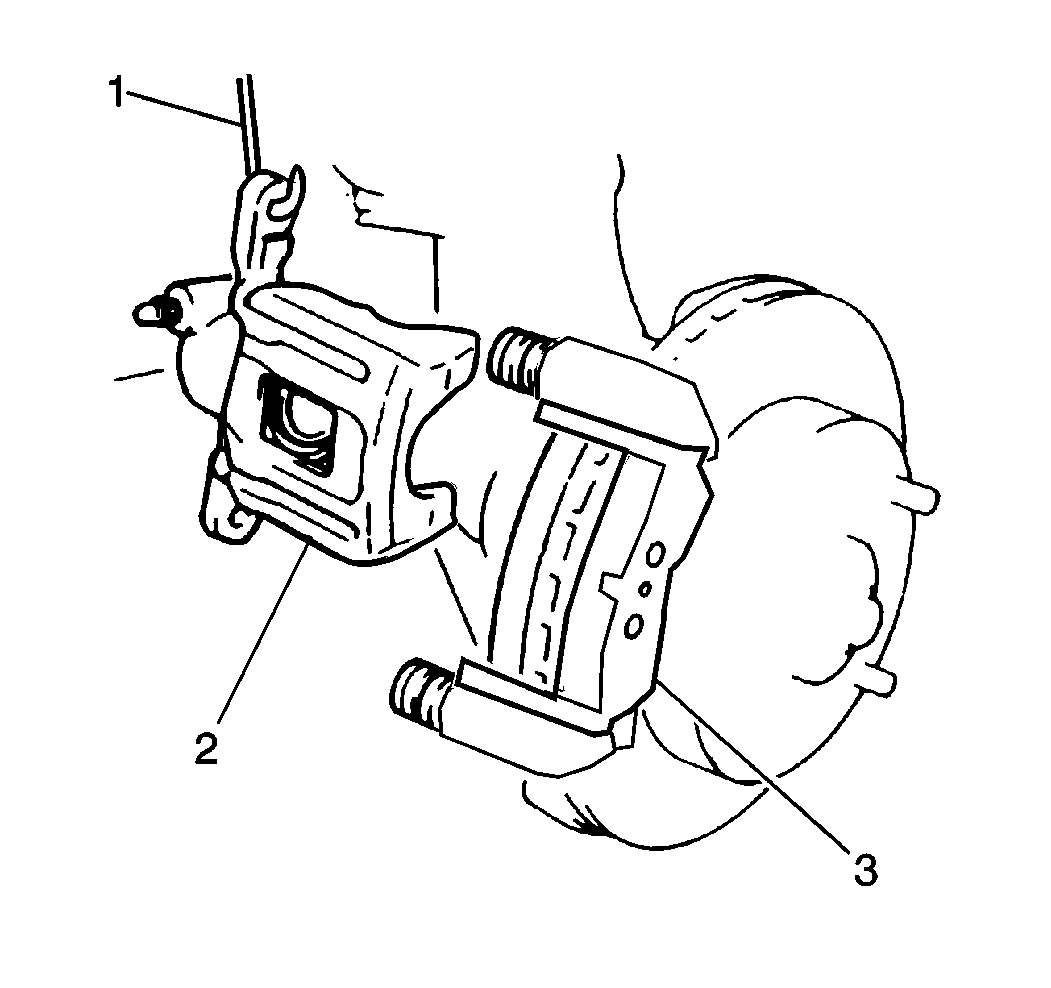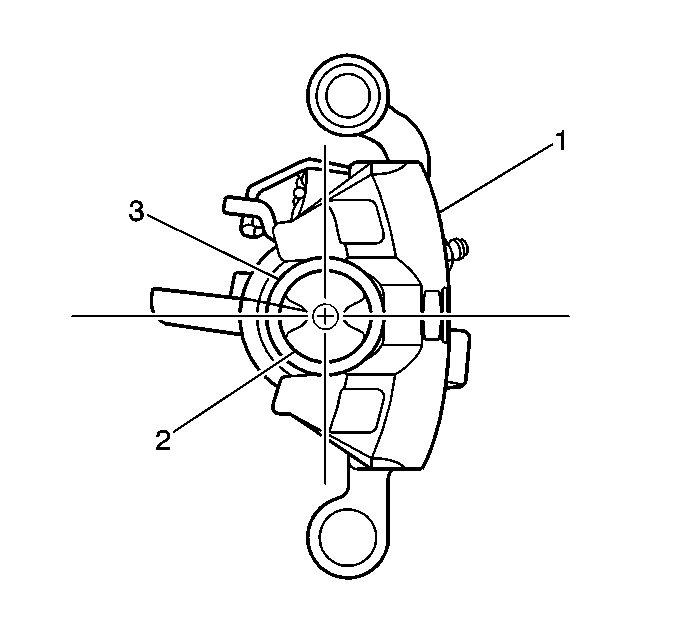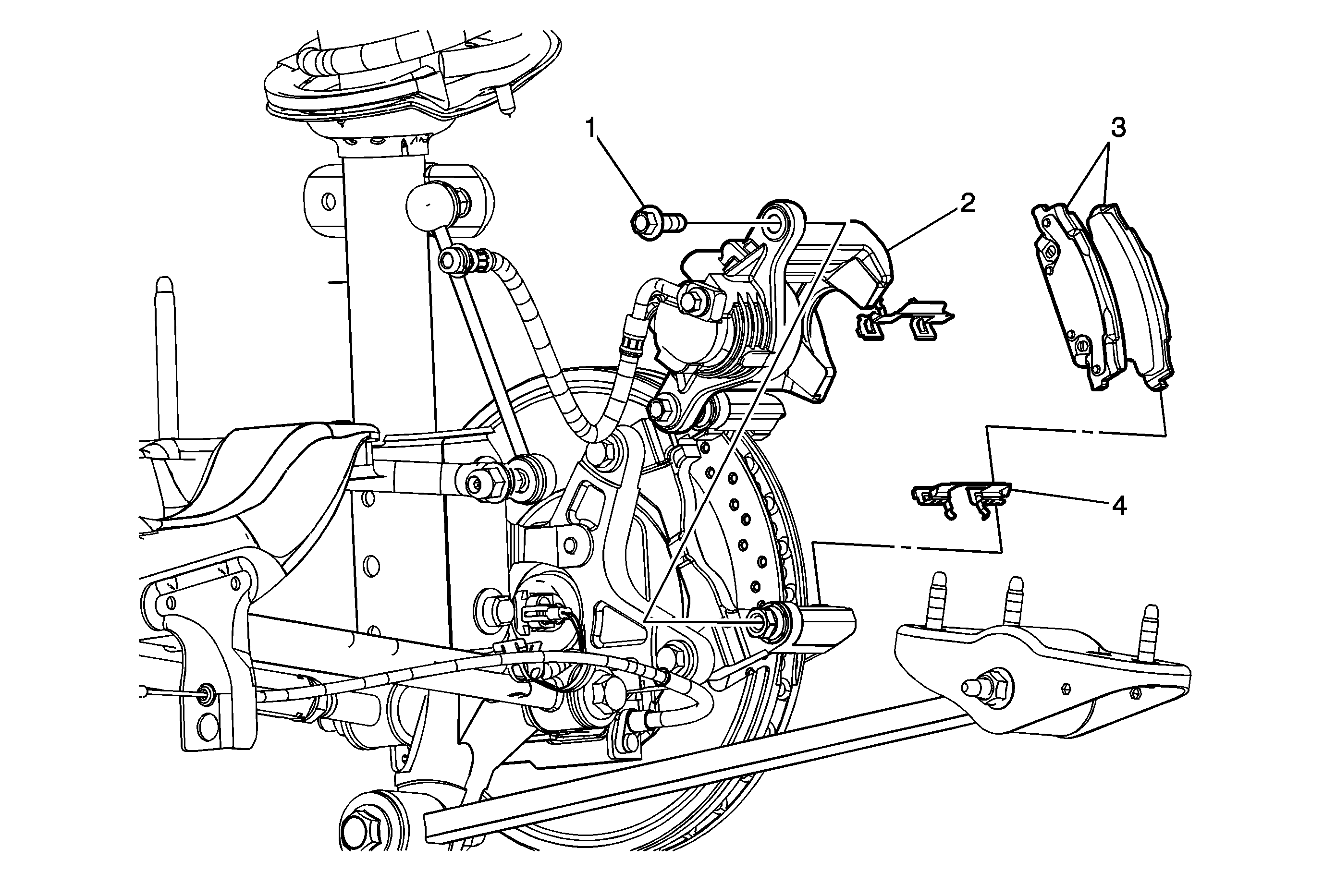Rear Disc Brake Pads Replacement J65, JL9
Caution: Refer to Brake Dust Caution in the Preface section.
Removal Procedure
- Inspect the fluid level in the brake master cylinder reservoir.
- If the brake fluid level is midway between the maximum-full point and the minimum allowable level, no brake fluid needs to be removed from the reservoir before proceeding.
- If the brake fluid level is higher than midway between the maximum-full point and the minimum allowable level, remove brake fluid to the midway point before proceeding.
- Raise and support the vehicle . Refer to Lifting and Jacking the Vehicle .
- Remove the tire and wheel assembly. Refer to Tire and Wheel Removal and Installation .
- Remove both upper and lower caliper bolts (3) from the caliper (1).
- Pull the caliper (2) straight off of the bracket and secure out of the way with heavy mechanics wire (1). DO NOT disconnect the hydraulic brake flexible hose from the caliper.
- Remove the inboard and outboard pads from the brake caliper bracket.

Notice: Support the brake caliper with heavy mechanic wire, or equivalent, whenever it is separated from its mount and the hydraulic flexible brake hose is still connected. Failure to support the caliper in this manner will cause the flexible brake hose to bear the weight of the caliper, which may cause damage to the brake hose and in turn may cause a brake fluid leak.

Installation Procedure
- Inspect the brake caliper guide pin seals for cuts, tears, or deterioration and replace, if necessary. Refer to Rear Disc Brake Hardware Replacement .
- Clean the brake pad hardware mating surfaces on the caliper bracket of any debris or corrosion.
- Inspect the brake pad retainer clips for corrosion or damage and replace, if necessary.
- Inspect the brake caliper piston boot for deterioration or damage and replace if necessary. Refer to Rear Brake Caliper Overhaul .
- Retract the brake caliper piston (2) into the brake caliper bore. Use a suitable spanner type wrench and turn the piston clockwise until it bottoms out fully in the brake caliper (Mac® Tools DBC 25 C 2500 MA Disc Brake Caliper Tool Set, or equivalent).
- Align the indents on the piston face to match the pin on the back of the inboard brake pads.
- Install the brake pad retainers into the brake caliper bracket.
- Install the inboard and outboard brake pads into the brake caliper bracket insuring that the pad with the metallic wear sensor is placed on the inboard side of the bracket.
- Slide the caliper onto the bracket insuring that the bracket guide boots are not damaged.
- Insert the brake caliper bolts.
- Install the tire and wheel assembly. Refer to Tire and Wheel Removal and Installation .
- Lower the vehicle. Refer to Lifting and Jacking the Vehicle .
- With the engine OFF, gradually apply the brake pedal to approximately 2/3 of its travel distance.
- Slowly release the brake pedal.
- Wait 15 seconds, then repeat steps 14-15 until a firm brake pedal apply is obtained. This will properly seat the brake caliper pistons and brake pads.
- Fill the brake master cylinder reservoir to the proper level. Refer to Master Cylinder Reservoir Filling .
- Burnish the brake pads and rotors. Refer to Brake Pad and Rotor Burnishing .

Notice: Refer to Fastener Notice in the Preface section.
Tighten
Tighten the brake caliper bolts to 34 N·m (25 lb ft).
Rear Disc Brake Pads Replacement Z7U

Callout | Component Name | ||||||
|---|---|---|---|---|---|---|---|
|
Caution: Refer to Brake Dust Caution in the Preface section. Notice: Support the brake caliper with heavy mechanic wire, or equivalent, whenever it is separated from its mount and the hydraulic flexible brake hose is still connected. Failure to support the caliper in this manner will cause the flexible brake hose to bear the weight of the caliper, which may cause damage to the brake hose and in turn may cause a brake fluid leak. Preliminary Procedures
| |||||||
1 | Bolt, Brake Caliper Pin (Qty: 2) Notice: Refer to Fastener Notice in the Preface section. Tighten | ||||||
2 | Caliper, Brake Tip
| ||||||
3 | Pads, Disc Brake | ||||||
4 | Retainer, Brake Pad Spring Tip
| ||||||
